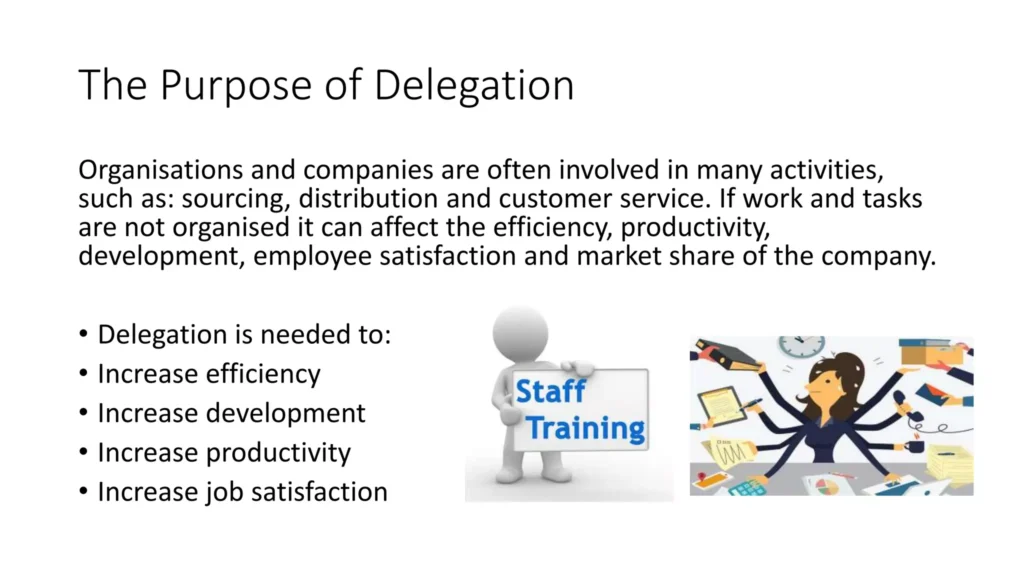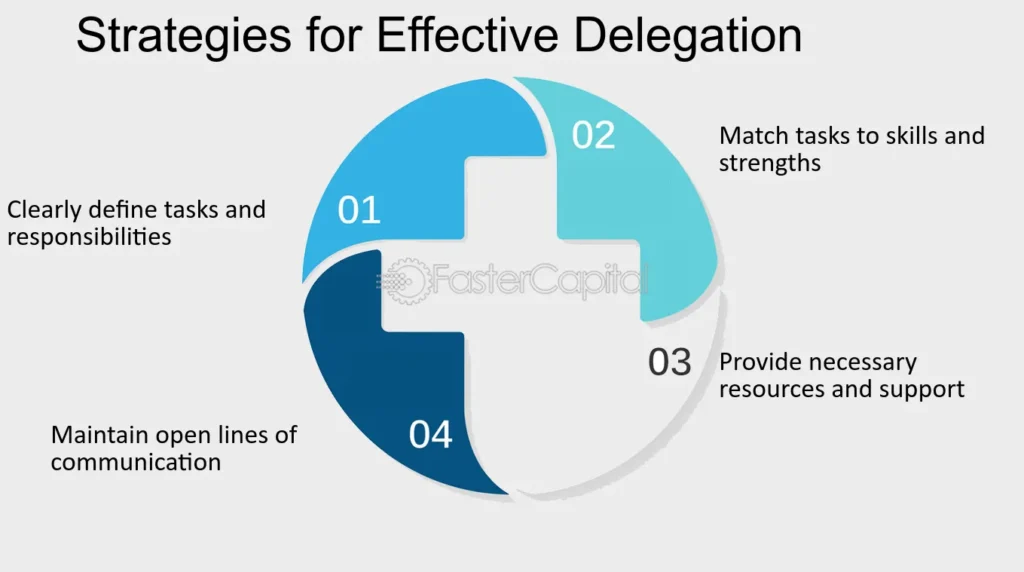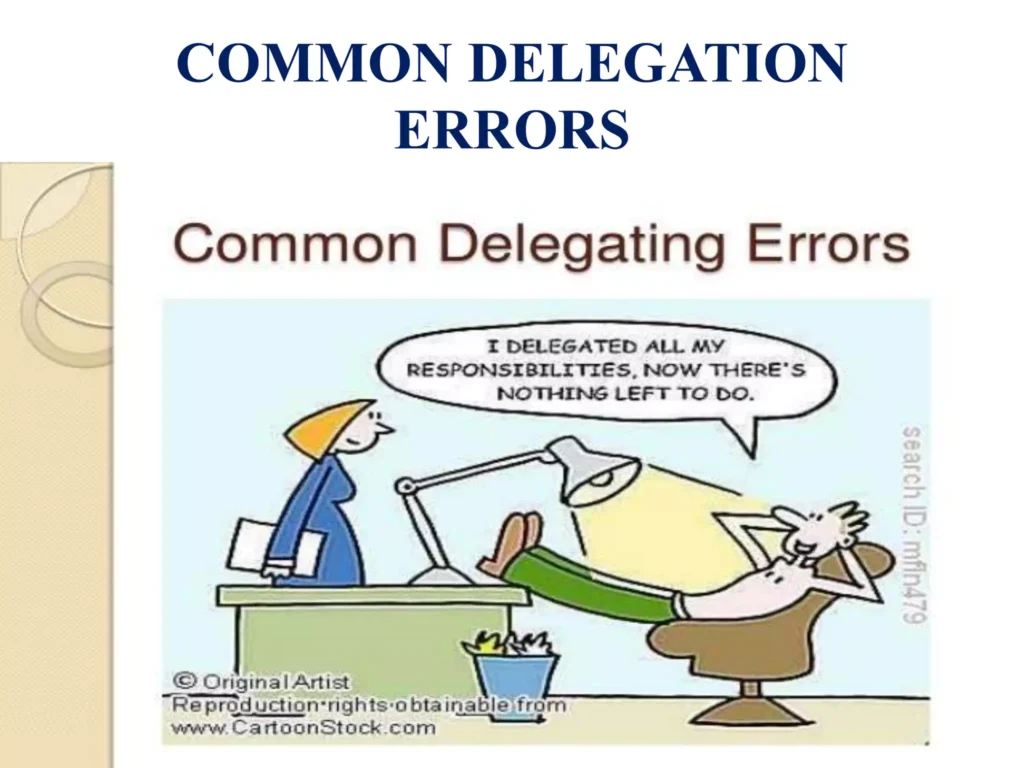Table of Contents
ToggleSTAFF DELEGATION
A manager alone cannot perform all the tasks assigned to him. In order to meet the targets, the manager should delegate authority. To delegate is to give another person some of one’s authority or in other words, to give another person the power to make decisions.
Delegation of Authority means division of authority and powers downwards to the subordinate.
Delegation of authority can be defined as subdivision and sub-allocation of powers to the subordinates in order to achieve effective results.
Delegation is the assignment of responsibility or authority to another person (normally from a manager to a subordinate) to carry out specific activities.
Delegation is the assignment/transfer of authority and responsibility to another person to carry out specific activities.
Delegation: Delegation is transferring to a competent individual the authority to perform a selected nursing task in a selected situation. (The National Council of State Boards in Nursing, 1995).
Delegator: The delegator possesses the authority to delegate by virtue of both positions in the agency.
Delegate: The delegate receives direction for what to do from the delegator.
While delegating, the delegator transfers to a competent individual (delegate) the authority and responsibility to perform a selected task (nursing task) in a selected situation (nursing situation). while retaining accountability for the outcome (Eleanor .J. Sullivan 2005,2013).
Rights to delegation
The following five rights to delegation are presented from the perspectives of both nursing service administrator and staff nurse.
These rights entail delegating tasks to:
- The Right person,
- The Right task,
- in The Right Circumstances,
- With The Right Direction/communication, and carry out,
- The Right supervision and evaluation.

Purposes of delegation
- Decision-Making Efficiency: Delegation allows health workers in rural areas to make decisions based on the specific circumstances they encounter. This saves time by avoiding delays that may occur when waiting for decisions from a central office or distant authority.
- Job Satisfaction and Skill Development: Allowing health workers to make decisions gives them a sense of ownership and enjoyment in their work. It also helps them gain knowledge and skills as they take on more responsibilities.
- Organizational Goal Achievement: Delegation contributes to achieving the overall goals of the organization by distributing tasks and responsibilities among team members.
- Time and Cost Savings: Delegating tasks to capable individuals saves time and reduces costs by avoiding the need for managers to personally handle every task.
- Professional Growth: Delegation provides opportunities for employees to receive training and develop their professional skills.
- Managerial Development: Delegation allows managers to focus on higher-level tasks such as decision-making, policy formulation, and planning, which contributes to their own professional growth.
- Efficiency and Flexibility: Delegation helps organizations operate efficiently and adapt to changing circumstances by empowering employees to take appropriate actions.
- Responsibility and Succession Planning: Delegation creates a managerial class within the organization and creates a sense of responsibility among subordinates. It also helps in identifying potential successors for future leadership roles.
- Time Management: Delegating tasks frees up time for managers to focus on other important duties and responsibilities.
- Subordinate Training: Delegation provides an opportunity to train and develop the skills of subordinates, allowing them to grow professionally.
- Motivation: Delegation can motivate staff by giving them a sense of trust, responsibility, and autonomy in their work.
- Future Manager Preparation: Delegation allows potential future managers to gain experience and develop the necessary skills for leadership roles.
- Learning from Subordinates: Delegation enables managers to learn from their subordinates’ expertise and perspectives, fostering a culture of continuous learning and improvement.
- Empowering On-Site Decision-Making: Delegation allows individuals on the ground to make timely decisions based on their knowledge and understanding of the situation.
- Overcoming Resistance to Change: Delegation can help overcome resistance to change by involving employees in decision-making and giving them a stake in the process.
Disadvantages of Delegation in Management:
- Poor Decision Making: If wrong decisions are made during the delegation process, the work may not be done or it may be done less effectively. It is important for leaders to carefully consider who they delegate tasks to and ensure that the individuals have the necessary skills and knowledge to handle the responsibilities.
- Over-delegation: There is a risk that a leader may delegate all the work, leaving very little for themselves to do. This can lead to a lack of direction and control, as well as a loss of connection with the team. It is important for leaders to strike a balance between delegating tasks and maintaining their own involvement in the work.
- Inexperienced Decision Makers: Delegating decisions to individuals with insufficient experience can have negative consequences. Lack of expertise and knowledge may result in poor decision-making, which can impact the overall quality of work and outcomes. Leaders should carefully assess the capabilities of those they delegate decision-making authority to.
- Burden on Employees: Giving an employee too many tasks to complete can create a burden and overwhelm them. This can lead to increased stress, decreased motivation, and a decline in the quality of work. It is important for leaders to distribute tasks evenly among team members and ensure that they have the necessary resources and support to handle their workload effectively.
- Poor Quality of Work: Delegating tasks to individuals who are not skilled or qualified for the job can result in poor quality work. Lack of proper training, guidance, or alignment of expectations can lead to subpar outcomes. It is essential for leaders to assess the capabilities of their team members and provide necessary support and training to ensure high-quality work.
- Loss of Worker Confidence: When failures occur as a result of delegation, it can negatively impact the confidence and morale of the workers involved. If employees consistently face setbacks or experience the consequences of poor decision-making, they may lose trust in their own abilities and the effectiveness of the delegation process.
- Lack of Control: Delegating tasks means giving up some level of control over the outcome. This can be challenging for managers who prefer to have direct oversight and may lead to feelings of uncertainty or anxiety.
- Communication Issues: Effective delegation requires clear and concise communication. If instructions are not properly conveyed or understood, it can lead to misunderstandings and errors in the work performed.
- Potential for Conflict: Delegation can sometimes lead to conflicts within a team. Miscommunication, differing expectations, or a lack of clarity in roles and responsibilities can create tension and hinder collaboration.

Delegation Process
1. Define/Identify the task(Determine what you will delegate.): The first step is to identify the task or responsibility that can be delegated. Managers should consider the nature of the task, its complexity, and the skills required to complete it
- Figure out what needs to be done. Delegate tasks that you’re responsible for and have authority over.
- Delegate routine tasks or tasks that aren’t a top priority for you.
- Consider if the task requires special skills or qualifications, and if training is needed.
2. Decide on the delegate/Select the right person: Once the task is identified, managers need to select the most suitable person to delegate it to. This involves considering the individual’s skills, knowledge, experience, and availability
- Choose the right person for the job based on their skills, experience, character, and enthusiasm.
- Make sure the person you choose is available to take on the task.
3. Determine the task/Provide clear instructions/Clarify the desired results.: It’s important to provide clear and detailed instructions to the person who will be responsible for the task. This includes explaining the objectives, expectations, deadlines, and any specific guidelines or requirements
- Clearly explain what you expect from the delegate.
- Describe the task using “I” statements and explain why it’s important.
- Set standards for evaluation and let the delegate know about any constraints or risks involved.
- Make sure the delegate understands the task and your expectations by answering questions and giving feedback.
4. Reach an agreement/Delegate authority: Along with assigning the task, managers should delegate the necessary authority to the individual. This means granting them the power to make decisions, access resources, and take necessary actions to complete the task
- Make sure the delegate agrees to take on the responsibility and authority of the task.
- Be ready to provide support, like extra information or resources, to help the delegate succeed.
- Anticipate negotiation and be clear about what support you can provide.
- Offer support and resources: Managers should ensure that the person delegated with the task has the necessary support and resources to accomplish it successfully. This may include providing training, guidance, tools, and any other assistance required
5. Monitor performance/Monitor progress: Monitor the progress of the delegated task. Regular check-ins and updates help ensure that the task is on track and any issues or challenges can be addressed promptly
- Keep an eye on how the task is being carried out and give feedback to ensure it’s done correctly.
- Stay accessible to offer support and address any concerns.
- Analyze performance based on established goals and address any problems privately.
6. Provide feedback: Once the task is completed, managers should provide feedback to the individual. This includes recognizing their efforts, acknowledging their achievements, and offering constructive feedback for improvement
- Provide praise and recognition for a job well done, and offer guidance on how to improve if needed.

Strategies for Effective Delegation: How to Achieve Desired Objectives
- Plan Ahead: Before delegating tasks, take the time to plan and prioritize your own workload. Identify which tasks can be delegated and determine the desired outcomes.
- Identify Necessary Skill Levels: Assess the skills and capabilities required for each task. Match the tasks with individuals who have the necessary skills and knowledge to complete them successfully.
- Select the Most Capable Person: Choose the person who is best suited for the task based on their skills, experience, and workload. Consider their strengths and interests to ensure they are motivated to complete the task effectively.
- Communicate the Goal Clearly: Clearly communicate the objectives, expectations, and desired outcomes of the task to the person you are delegating to. Provide all the necessary information and answer any questions they may have.
- Empower the Delegate: Give the person you are delegating to the authority and autonomy to make decisions and take ownership of the task. Trust their abilities and provide support when needed.
- Set Deadlines and Monitor Progress: Establish clear deadlines for the task and regularly check in on the progress. Provide guidance and support as necessary to ensure the task stays on track.
- Model the Role; Provide Guidance: Lead by example and demonstrate how the task should be done. Offer guidance, resources, and support to help the delegate succeed.
- Evaluate Performance: Regularly evaluate the performance of the person you have delegated the task to. Provide constructive feedback and address any issues or concerns that arise.
- Reward Accomplishment: Recognize and reward the successful completion of delegated tasks. Show appreciation for the efforts and achievements of the person you have delegated to, which can motivate them and encourage future success.
Advantages/Benefits of delegation
To the organization:
- Teamwork improves; therefore the organization will benefit by achieving its goals more efficiently.
- Productivity will increase and hence the organization’s financial position will improve.
- The quality of care also improves.
- Efficiency increases the quality of care and hence improves client (patient) satisfaction.
To the manager/delegator/In-charge
- The manager will be able to devote more time to those tasks which cannot be delegated and be able to achieve more.
- During the manager’s absence, the work still continues normally hence tasks will be accomplished.
- The manager’s own reputation will improve as being a trusting manager and someone who invests in the development of the team.
- With more time available, the manager can develop more skills and abilities thereby facilitating his/her career advancement.
To the delegatory
- Builds trust and support thus creating self-esteem and confidence.
- Delegation may increase or improve cooperation enhancing team work.
- Higher chances of promotion if the delegate performs her/ his assigned task or duties.
- The delegate gains new skills and abilities that can facilitate upward mobility.
- Job satisfaction and motivation are enhanced as individuals feel stimulated by new challenges.
- Moral improvement: A sense of pride and belonging develops as well as greater awareness of responsibility.

Barriers to Delegation:
Environmental Factors:
- Job descriptions: Sometimes, the job descriptions may not clearly define what tasks can be delegated, making it difficult to assign responsibilities.
- Policies: Organizational policies may restrict or limit delegation in certain areas, creating barriers.
- Resources: Lack of necessary resources or support can hinder delegation efforts.
- Standards: Adherence to certain standards or regulations may affect the delegation process.
- Norms: Cultural or organizational norms may discourage delegation or influence how it’s perceived.
- Management styles: Different management styles may either facilitate or impede delegation.
- Organizational structure: The way the organization is structured can impact how delegation is carried out and perceived.
Nurse Manager:
- Lack of trust and confidence: If the nurse manager doesn’t trust the abilities of their team members, they may hesitate to delegate tasks.
- Belief others are incapable: Some nurse managers may doubt the capabilities of their team members, leading them to take on tasks themselves instead of delegating.
- Fear of competition: Nurse managers may fear that delegating tasks will make their subordinates look more competent, posing a threat to their own position.
- Inexperience in delegation: Lack of experience or training in delegation can make nurse managers hesitant to assign tasks to others.
- Fear of criticism: Nurse managers may fear being criticized for delegating tasks if something goes wrong.
- Fear of loss of control: Delegating tasks means giving up some level of control, which can be daunting for some nurse managers.
- Insecurity: Feelings of insecurity may prevent nurse managers from trusting others to complete tasks effectively.
- Fear of overburdening: Nurse managers may worry about overburdening their team members with additional tasks.
- Fear of blame for others’ mistakes: Nurse managers may fear being held responsible for mistakes made by their subordinates when tasks are delegated.
Delegatory:
- Inexperience: Lack of experience in handling delegated tasks can make individuals hesitant to take them on.
- Fear of failure and reprisal: There may be a fear of failing to complete delegated tasks satisfactorily and facing negative consequences.
- Lack of confidence: Individuals may lack confidence in their abilities to successfully complete delegated tasks.
- Overdependence on others: Some individuals may rely too heavily on others to complete tasks, which can hinder delegation efforts.

Common errors in delegation (ineffective delegation)
Under delegation: Under delegation happens when:
- The person delegating doesn’t give the delegate full authority to complete the task.
- The person delegating takes back parts of the task, or
The person delegating doesn’t properly equip and guide the delegate.
- This results in the delegate being unable to finish the task, and the person delegating has to take over again to get it done.
Over delegation: Over delegation occurs when the person delegating gives the delegate too much authority (the right to act) and responsibility (the duty to accomplish a task). This can lead to loss of control over the situation.
Reverse delegation: In reverse delegation, someone with less authority delegates tasks to someone with more authority. For example, a staff member asks their manager to do a task that they should be doing themselves. This isn’t an efficient use of the manager’s time. Instead, the manager should help the staff member manage their time better and delegate responsibilities effectively.
Unnecessary duplication: If multiple staff members are doing the same task, it may be because the manager has assigned related tasks to too many people. To avoid unnecessary duplication, tasks should be delegated to as few people as possible. This streamlines reporting and prevents confusion about who is responsible for what task.
Improper delegation involves assigning tasks at the wrong time, to the wrong person, or for the wrong reasons. This can also include giving tasks that are beyond the capability of the person assigned.
Upward delegation happens when a subordinate delegates a task back to their manager, relying on the manager to complete the task instead of taking responsibility themselves.
Upward delegation involves a subordinate seeking assistance or guidance from their manager on tasks they should be handling themselves. It’s more about seeking help or approval from a higher authority rather than attempting to delegate tasks upward. On the other hand, reverse delegation involves a lower-ranking individual delegating tasks to someone with more authority or a higher rank, which goes against the usual flow of delegation within an organization.
Kinds of Delegations
Full Delegation: Full delegation involves assigning complete authority and responsibility for a task or role to another person or group. The person or group has the autonomy to make decisions and take actions without constant supervision or approval. E.G. A manager delegates the responsibility of managing a project to a team leader. The team leader has the authority to make decisions, allocate resources, and oversee the project from start to finish.
Partial Delegation: Partial delegation involves assigning a portion of authority and responsibility for a task or role to another person or group. The person or group shares the responsibility with the delegator but may require guidance or approval for certain aspects.E.G. A manager delegates the responsibility of handling customer complaints to a customer service representative. The representative can resolve most complaints independently but may need to consult the manager for complex or escalated issues.
Conditional Delegation: Conditional delegation involves assigning authority and responsibility to another person or group based on specific conditions or circumstances. The delegation is contingent upon meeting certain criteria or fulfilling certain requirements. E.G. A manager delegates the authority to approve expenses to an employee but only if the expenses fall within a specified budget limit. The employee can make decisions within the set limit, but any expenses exceeding that limit require approval from the manager.
Formal Delegation: Formal delegation occurs when authority and responsibility are granted according to the formal structure and hierarchy of an organization. It follows established procedures and is documented in official records or agreements. E.G. A company’s CEO delegates the authority to sign contracts to the Chief Legal Officer. This delegation is formalized through a written agreement that outlines the scope of authority, limitations, and reporting requirements.
Informal Delegation: Informal delegation occurs when authority and responsibility are granted outside the formal structure and hierarchy of an organization. It is based on trust, relationships, and informal agreements rather than official procedures. E.G. A team leader delegates the responsibility of coordinating team meetings to a team member who has shown strong organizational skills. This delegation is based on the leader’s trust in the team member’s abilities and does not involve formal documentation

Elements of Delegation
Delegation depends on a balance of responsibility, accountability and authority.
- Authority –is the power and right of a person to use and allocate the resources efficiently, to take decisions and to give orders so as to achieve the organizational objectives. Authority must be well- defined. All people who have the authority should know what the scope of their authority is and they shouldn’t mis-utilize it. Authority is the right to give commands, orders and get the things done.
- Responsibility – is the duty of the person to complete the task assigned to him. A person who is given the responsibility should ensure that he accomplishes the tasks assigned to him. If the tasks for which he was held responsible are not completed, then he should not give explanations or excuses. Responsibility without adequate authority leads to discontent and dissatisfaction among the person. Responsibility flows from bottom to top. The middle level and lower level management holds more responsibility. The person held responsible for a job is answerable for it. If he performs the tasks assigned as expected, he is bound for praise. While if he doesn’t accomplish tasks assigned as expected, then also he is answerable for that.
- Accountability – means giving explanations for any variance in the actual performance from the expectations set. Accountability cannot be delegated. For example, if ’A’ is given a task with sufficient authority, and ’A’ delegates this task to B and asks him to ensure that task is done well, responsibility rests with ’B’, but accountability still rests with ’A’. The top level management is most accountable. Being accountable means being innovative as the person will think beyond his scope of job. Accountability, in short, means being answerable for the end result. Accountability can’t be escaped. It arises from responsibility.
Functional clarity – The functions to be performed, methods of operation and results expected must be clearly defined.
Differences between Authority and Responsibility
Authority | Responsibility |
|
|
|
|
|
|
|
|

Principles of Effective Delegation:
Dos:
- Clarify what you delegate: Clearly define the task, objectives, deadlines, and expectations.
- Select the right person: Choose someone with the skills, knowledge, and experience to handle the task effectively.
- Inform stakeholders: Let everyone involved know who is responsible for the delegated task.
- Avoid micromanagement/Do not interfere unnecessarily: Give your delegate the freedom to complete the task without constant oversight.
- Be prepared for mistakes: Understand that mistakes can happen and be willing to offer support and guidance.
- Provide resources and support: Ensure your delegate has the necessary tools, information, and assistance to succeed.
- Delegate legally: Only delegate tasks that you are legally allowed to delegate.
Don’ts:
- Don’t delegate without clear instructions: Leaving your delegate unclear about expectations can lead to confusion and errors.
- Don’t delegate to someone who isn’t capable: Choosing the wrong person can result in poor quality work and missed deadlines.
- Don’t keep stakeholders in the dark: Failing to inform others can lead to communication breakdowns and duplication of effort.
- Don’t micromanage: Constant interference can demotivate your delegate and hinder their progress.
- Don’t punish mistakes: Mistakes are learning opportunities. Be supportive and offer guidance instead of reprimands.
- Don’t withhold resources: Lack of resources can hinder your delegate’s ability to complete the task effectively.
- Don’t delegate what you can’t: Some tasks, like certain legal responsibilities, cannot be delegated.
- Don’t allow further delegation: Ensure your delegate understands they are responsible for the task and cannot delegate it further without your permission.
CONSTRAINTS TO EFFECTIVE DELEGATION:
- Lack of confidence in the subordinates.
- Reluctance of the supervisor to delegate since he/she feels can accomplish the task.
- Feeling of insecurity that is the subordinate may subsequently take over her role.
- Lack of communication skills to make the delegate understand her/his role/responsibilities.
- The delegate may lack technical skills required to accomplish the task.
- Lack of willingness by the staff/subordinate to take up the responsibility.
- Prestige and power consciousness by the manager.
- Confidential nature of task.
- Legal impediments associated with the way the task is done/accomplished.
FACTORS THAT AFFECT DELEGATION:
- Size of organization: usually small organizations have limited role/activities to accomplish therefore delegation is minimal yet in bigger organizations delegations is very necessary.
- Importance of the duty or decision: important sensitive organizational decisions need the involvement and control by the top manager while less sensitive/important tasks can.
- Task complexity: some tasks are better performed by the managers because of their expertise and thus cannot be delegated since the subordinates may lack enough expertise to accomplish them. Whereas others may be performed by any employee of the organization.
- Organizational culture: these are the norms, expectations, and values of the organization whereby some organizations always prefer the manager to be the final decision maker in all organizational activities hence do not opt/support delegation which is opposite in other organizations.
- Qualities of subordinates: before delegating roles to subordinates consideration of their abilities, strengths, and weaknesses should always be put at the back of the mind.

